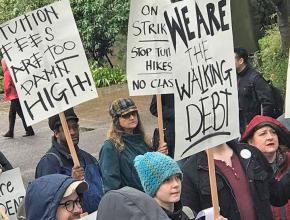Stopping a tuition increase at Portland State
Faced with a tuition increase by about one-third over four years, students at Portland State University organized against it, write and .
A THREATENED student strike at Portland State University (PSU) has stopped a tuition increase--for now. When the Board of Trustees proposed a 31 percent tuition hike over the next four years, students responded with a call to shut the campus down.
In response, the board postponed their vote and began to backpedal on the increase. "We pushed them back two weeks," said Camilo Abreu Assad, a student senator. "Next four weeks, then eight weeks, then a year, then lower, then free, and we're never going to stop."
Tuition has been rising for university students all across the U.S. for the last several decades. According to U.S. News And World Report, public university in-state tuition and fees have increased 237 percent in the last 20 years alone.
But it's not just the tuition itself that's rising. According to a report by the State Higher Education Executive Officers Association, 2017 broke the record for the proportion of education revenue collected from students and families for public colleges and universities--a historic 46.2 percent, compared to 36.2 percent in 2007 and 28.8 percent in 1992.

On Thursday, April 5, a town-hall style meeting was held in PSU's Native American Student and Community Center, with about 100 angry students staring daggers at the PSU administration bureaucrats--who were ostensibly there to "address concerns" about rising tuition.
Students weren't reassured whatsoever by the bureaucrats' tepid defenses and deflections of their questions. Some students carried signs that said "Students are in debt" and "No Tuition Increases!"
As student after student testified before the board, they talked about lifelong debt, food insecurity, multiple jobs and even houselessness as the results of these tuition increases, which push many out of university altogether.
ASSOCIATED STUDENTS of Portland State University (ASPSU), the student body government, called for a student strike to start a week after the town-hall meeting, on April 12.
ASPSU and along with other campus groups, including the Portland State University Student Union (PSUSU, a distinct group from ASPSU), Young Democratic Socialists of America (YDSA), International Socialist Organization (ISO) and Socialist Alternative, helped make class announcements and passed out flyers for the strike. The students got the cooperation of over 100 professors.
A socialist caucus within ASPSU, the Democratic Collective of Students and Workers (DCSW), released a statement motivating the strike, an excerpt of which reads:
The reason for calling a strike is a rational one. We began with a rally of students at a budget forum. These forums had been historically under-attended and resulted in continual tuition hikes. Our first rally mobilized over a hundred students and successfully pressured the Board of Trustees to consider compromising on the extent of tuition hikes. Without public political pressure, the administrators are free to push a singular perspective about the economics of our university.
Despite the short notice for a strike, an effective and rapidly deployed campaign by ASPSU and its allies generated an impressive amount of attention, with slogans such as "Tuition Hike? Go On Strike!" on their flyers.
Pete Nickerson, former Nike executive and current Board of Trustees member, made the motion to postpone the tuition increase vote, claiming that "for the first time in four years," he was listening to students' stories and proposals because the student body president and vice president had been "measured, rational, and civil" in their presentations to the board.
This just after ASPSU President Brent Finkbeiner announced the strike, calling for a three-year tuition freeze--and if there was a tuition increase, the top 25 administrators whould take a proportionate cut.
Student leaders look forward to some breathing room to organize an even stronger tuition freeze campaign. As the socialists at the center of the struggle agree, building a massive student-labor alliance is the only hope of securing an affordable quality education.


